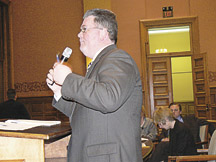The Jersey City City Council voted 8-0 to introduce the city’s fiscal year 2008-2009 budget at a special meeting Monday night.
The size of this year’s budget, introduced seven months into the fiscal year (which runs from July 1 of last year to June 30 this year), is $460.2 million, $15.7 million less than last year’s budget.
The city’s business administrator, Brian O’Reilly, said while the budget was “untimely,” it showed the effort that Mayor Jerramiah Healy and his administration have made to give the City Council a balanced budget. He said that $152.1 million of the budget will be raised through local property taxes, almost identical to the amount in last year’s budget.
For the average taxpayer, that will translate to $6 more on their annual tax bill over the course of this year if they own a house assessed at $200,000. The overall tax amount that residents pay each quarter comes from a combination of the city, school, and county budgets.
However, Jersey City residents have been complaining that when they received their tax bills last month, they saw a 28 percent increase in the amount from their previous bill due in October. According to the city’s head tax assessor, Edward Toloza, this is only because each year, tax bills are higher for February and May. He said they are then lower in August and October after the budget is passed.
Toloza says a more accurate assessment of how much property tax has increased is to look at the current quarter in question as compared to the same period last year, which shows only a 3.5 percent increase, he said.
Not a final budget
While the budget was introduced Monday, it is not official until all of the final amendments are in and the council takes a final vote. In the meantime, officials have a chance to make final cuts and suggestions.
Residents can do the same. A public hearing on the budget is scheduled for March 11 in the City Council Chambers in City Hall, 280 Grove St.
Before the public hearing, there will be individual budget hearings among various city departments to discuss their respective budgets.
Some time after March 11, the city can take a final vote to approve the plan, although it will be very late into the fiscal year and much of the money will already have been spent via temporary appropriations.
‘Plan B’
The currently proposed budget contains an $800,000-plus shortfall, which O’Reilly looks to remedy through cuts or increased revenues.
The budget also anticipates $14.8 million in savings that the city may not ultimately receive. The city is counting on the state legislature to pass a bill in the next few weeks that allows them to defer employee pension payments this year. If the legislation does not pass, the city will have to make up that $14.8 million shortfall another way.
The budget also anticipates that the city will receive less state aid than last year. O’Reilly believes they’ll get $7.2 million, or 10 percent less than the amount granted last year.
However, O’Reilly said that this year’s budget will not include a deficit, in the end. He based this assumption on the budgets, each one balanced, during his five years as the city’s business administrator. He referred to a “Plan B,” saying that he and other officials will look for various ways to save.
Ricardo Kaulessar can be reached at rkaulessar@hudsonreporter.com.
